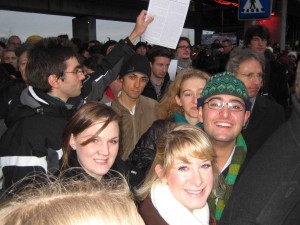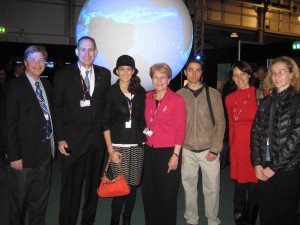INFORMATIVE NOTE: The conference is organized in negotiation sessions and side events. Side events are held by organizations representing all sectors of society, they happen inside the conference center or outside. Negotiation sessions can only be attended by parties and the press. Side events inside the conference can be attended by registered participants. Off-site side events can be attended by all. Rice students only attend side events inside and out of the conference center, and follow the negotiations on live stream webcasts.
HIGHLIGHTS:
1. UN manages to make registration Hell on Earth with waiting times up to 6 hours in the Danish cold.
2. Registrants display a great level of resilience and temperance, but one of us falls sick.

3. Negotiators are incapable to reach agreements and activist outside the Bella Centers protest. In contrast, societal sectors represented inside the conference sport a constructive “let’s get to business” approach and patience over the complexities of the negotiations.
4. Sectors represented in the side events: Agriculture, Manufacturing Industry, Transportation, Finance, NGOs, and the Church.
5. Sectors have well defined programs and little non-sense talk. They identify capabilities, loopholes, and critical needs.
6. Let me say it again: Very constructive attitudes among the sectors (in contrast to the ones among country delegations). All sectors see opportunities. Overall, there is a feeling that it can be done.
7. National institutions also held side events at the different national centers: The US held events on the science while EU focused on policy, technological and financial tools for mitigation and adaptation, reflecting the differences between the stage of negotiation at both sides of the ocean.
8. We meet with Dr. Jerry Schnoor, editor of ES&T, and Dr. Jane Lubchenco, administrator of the National Oceanographic and Atmospheric Administration (NOAA). Dr. Lubchenco gives a talk on the impacts of climate change on the oceans based on NOAA measurements.

